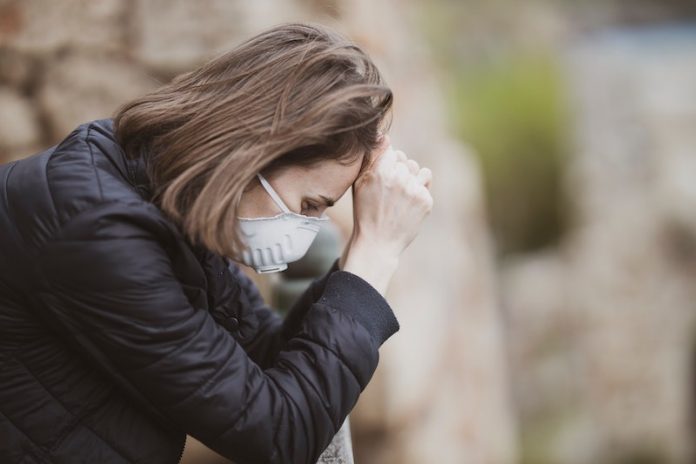
A new study from the University of Iowa found disease of the small airways in the lungs is a potential long-lasting effect of COVID-19.
They found that small airways disease occurred independently of initial infection severity.
The study is published in Radiology and was conducted by Alejandro P. Comellas et al.
Early reports indicate that more than 50% of adult survivors of SARS-CoV-2 infection experience post-acute sequelae of COVID-19 (PASC), more commonly known as “long COVID.”
Respiratory symptoms, including cough and dyspnea, are reported by nearly 30% of patients with long COVID, including those who experienced mild infection.
In the study, the team found many patients with initial SARS-CoV-2 infection who were either hospitalized or treated in the ambulatory setting later showed signs of chronic lung disease such as shortness of breath and other respiratory symptoms.
They put a protocol in place to perform both inspiratory and expiratory CT in these patients.
Air trapping is found in many obstructive airway diseases, such as asthma and chronic obstructive pulmonary disease (COPD).
In the study, the researchers compared CT findings in people who had COVID-19 and persistent symptoms with those of a healthy control group.
They enrolled 100 adults with confirmed COVID-19 who had remained symptomatic more than 30 days following diagnosis, along with 106 healthy participants.
The 100 COVID-19 survivors, median age 48 years, included 67 who were classified as ambulatory, or not requiring hospitalization, 17 who were hospitalized, and 16 who required care in the intensive care unit (ICU) during acute infection.
The researchers found air trapping on expiratory chest CT images in the COVID-19 group. The mean percentage of total lung affected by air trapping ranged from slightly more than 25% in the ambulatory group to almost 35% in the hospitalized group, compared with only 7.2% in healthy controls.
Air trapping persisted in eight of the nine participants who underwent imaging more than 200 days after diagnosis.
These results show a high prevalence of long-lasting air trapping, regardless of the initial severity of infection.
The team also found evidence of small airways disease. While small airways disease is not fully understood, evidence suggests it may be related to either inflammation or remodeling of the small airways that prevents air from being able to be exhaled from the lungs.
The median time from diagnosis to chest CT imaging was approximately 75 days.
The researchers noted that the persistence of respiratory abnormalities in this timeframe raises concern for permanent airway remodeling and fibrosis following SARS-CoV-2 infection.
Related: This new COVID-19 drug could effectively treat severe disease
A previous study from Australia and published in Nature Immunology found unvaccinated people with long COVID – even those whose initial infection was mild or moderate – have a sustained inflammatory response for at least eight months following their infection.
They found that there is a strong and sustained inflammation that indicates prolonged activation of the immune system response detectable for at least eight months following initial infection.
This suggests that long COVID is very different from other infections.
In that study, the team examined blood samples from 62 people with and without long COVID for a variety of ‘immune biomarkers’.
They compared these to people who had not had COVID-19 and they found persistently elevated levels of Type I and Type III interferons – types of protein cells make in response to the presence of a virus.
These interferons generally disappear after the infection clears, but in patients with long COVID they found they were present for an extended period.
Approximately 30% of unvaccinated people who contracted COVID and were followed in the study experienced some long COVID symptoms.
The researchers say that understanding the immune profile for long COVID will help the development of treatment and management of long COVID.
This study provides the strongest evidence to date for a clear biological basis for the clinically apparent syndrome of long COVID.
The team says the next steps are to apply this new understanding to other COVID-19 variants, and to further research to inform the treatment and management of long COVID.
If you care about Covid, please read studies about why some people cannot resist COVID-19 like others, and how to fight seasonal depression during the COVID-19 pandemic.
For more information about health, please see recent studies about 4 new COVID variants in New York City wastewater, and results showing this drug could help treat lung damage in COVID-19.
Copyright © 2022 Knowridge Science Report. All rights reserved.




